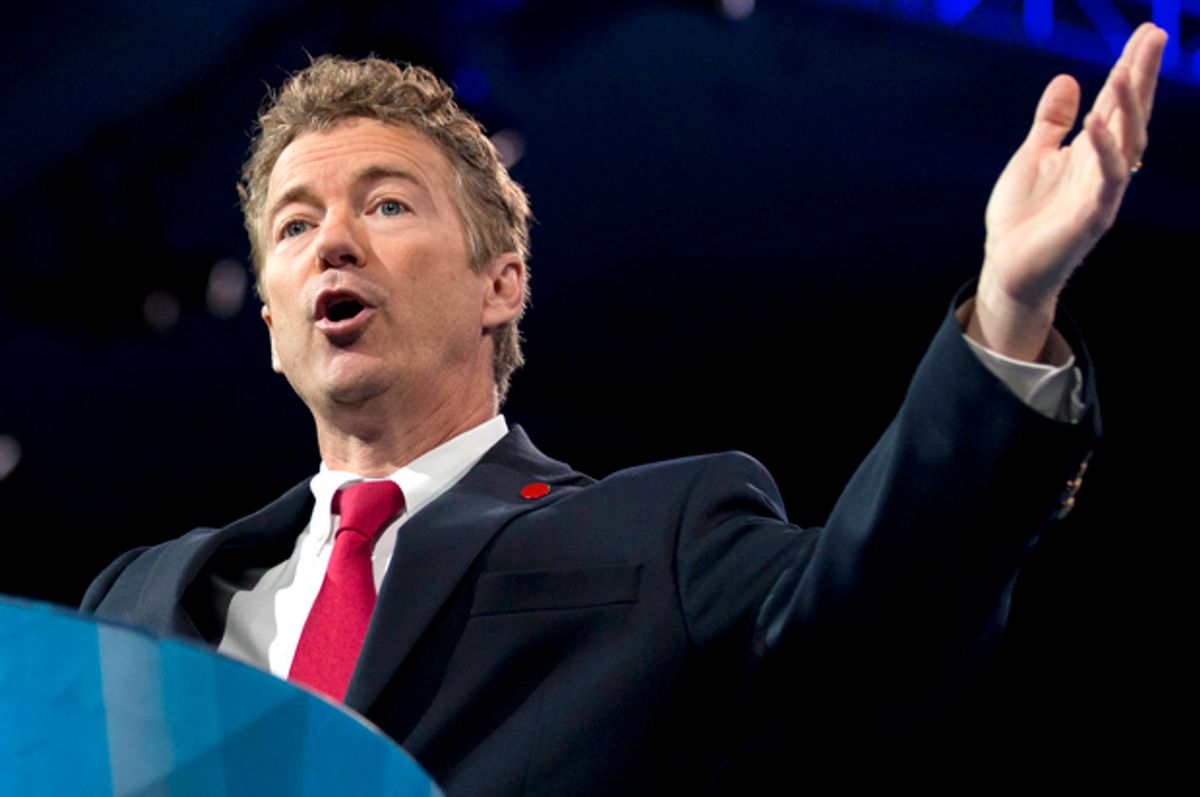The New York Times Magazine recently wondered at length if the long-prophecied Libertarian Moment had finally arrived. Why, just look at the prevailing attitudes in America: openness to same-sex marriage and liberalization of drug laws, aversion to long-term overseas military deployments ("wars"), and ... um ... Obama is unpopular so people hate government regulation now, maybe? Sure. Well, no. As we wrote, libertarianism as a package is going to be a hard sell to the public as long as it dismisses concerns over economic insecurity and insists upon dismantling the regulatory state and large social insurance programs. But hey, it's great that libertarians and liberals have common ground on and are making headway in social and criminal justice policy.
Who would be the foot soldiers in this Libertarian Moment that's not really arriving? The usual, well-funded thinkers that have given the "movement" a disproportionately large voice within debates in Washington, D.C., for decades -- Reason magazine, the Cato Institute -- along with a few MTV VJs from the '90s. Also: Rand Paul! Rand Paul is the son of a libertarian and is sort of a libertarian himself and is going to be the next president, after all. And then America will finally be the sexy free-market rock 'n' roll paradise of libertarians' imagination. There is a plan, folks.
But any political movement is going to need more than just a few magazines and think tanks and a scion whose political future depends on the extent to which he's willing to water down his libertarianism. Meaning: Libertarianism needs a lot more libertarians. If libertarianism is going to be the wave of the future, a significant portion of the American populace should a) know what "libertarianism" is and then b) subscribe to it.
Right now that portion is 11 percent -- not nothing, but also ... 11 percent. That's the figure according to Pew of Americans who "both say they are libertarian and know the definition of the term."
You'd expect, then, that those who know what "libertarianism" is and call themselves "libertarians" would be broadly in favor of the whole ideological package: "social liberalism," for lack of a better term, anti-police state, anti-interventionist, and hella anti-economic regulation and so forth -- small government, all around.
That's not necessarily the case among those 11 percent, Pew finds. The 11 percent are, indeed, more likely than the public overall to say “government aid to the poor does more harm than good by making people too dependent on government assistance," and "somewhat more likely than the public overall to say government regulation of business does more harm than good." They're also more likely than the public overall to support legalizing marijuana.
But on cops and foreign policy? Self-identified libertarians-who-generally-know-what-libertarianism-is are a little more supportive than the public overall of letting police do whatever the hell they want and bombing everyone all the time (although the foreign policy question is spectacularly vague):
And they are about as likely as others to favor allowing the police “to stop and search anyone who fits the general description of a crime suspect” (42% of libertarians, 41% of the public).
Similarly, self-described libertarians do not differ a great deal from the public in opinions about foreign policy. Libertarianism is generally associated with a less activist foreign policy, yet a greater share of self-described libertarians (43%) than the public (35%) think “it is best for the future of our country to be active in world affairs.”
Pew ran another math-y thing to figure out which "cluster," or political type, these self-identified libertarians are most closely aligned with. You'll never guess which cluster came out on top! It rhymes with "Schmusiness Schmonservatives."
That study used a statistical technique called “cluster analysis” to sort people into homogeneous groups, based on their responses to 23 questions about a variety of social and political values.
None of the seven groups identified by the 2014 political typology closely resembled libertarians, and, in fact, self-described libertarians can be found in all seven. Their largest representation is among the group we call Business Conservatives; 27% of this group says the term libertarian describes them well. Business Conservatives generally support limited government, have positive views of business and the U.S. economic system, and are more moderate than other conservative groups on the issue of homosexuality. However, they are also supportive of an activist foreign policy and do not have a libertarian profile on issues of civil liberties.
So who are your libertarians? A few hundred ideologically consistent professional libertarians working at magazines and think tanks in Washington, and then a bunch of rich conservatives who don't like to associate themselves nominally with those icky anti-gay jerks in the Republican Party. Libertarianism likes to present itself as the "a little bit from column A, a little bit from column B" option, but when it counts, it's a lot more of one than another. Which is why Rand Paul is a Republican and no one entertains the idea of him being a Democrat.



Shares